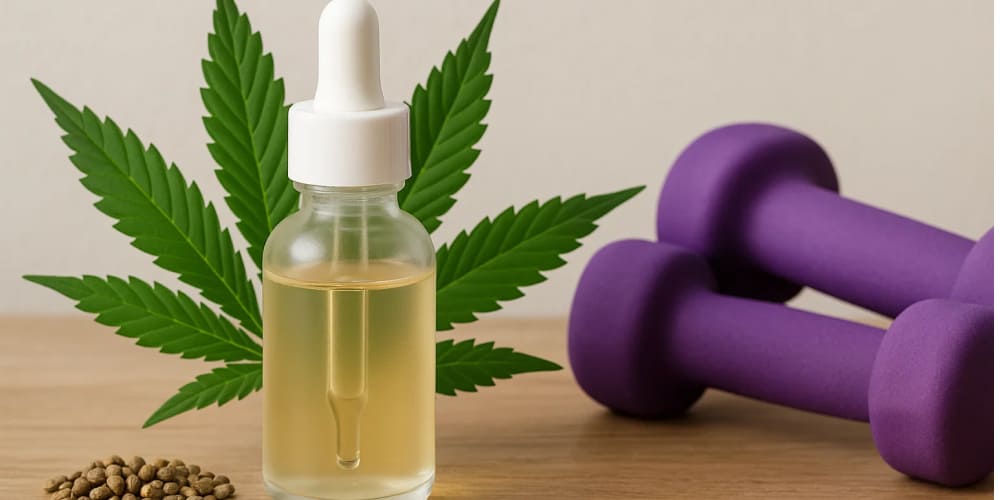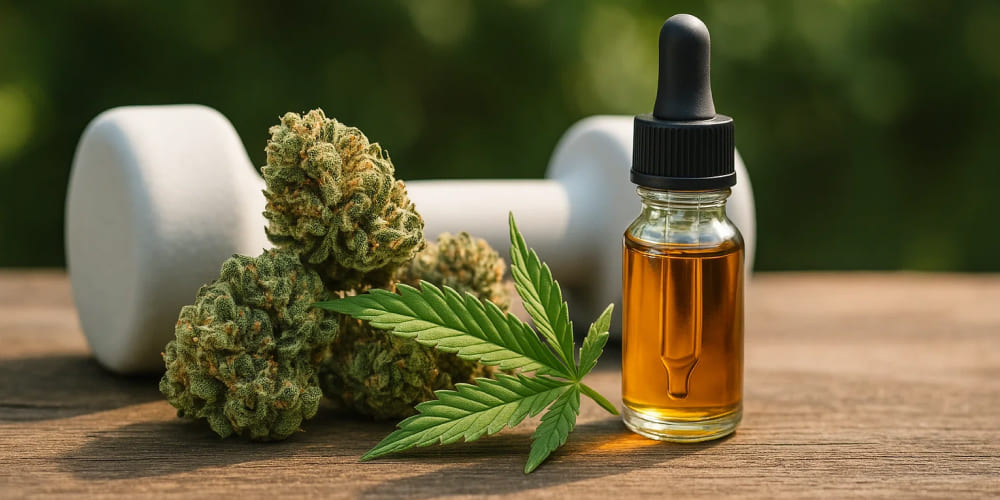
Weed Education
What is THCV and why is a it called fitness cannabinoid?

What is THCV and why is it called a fitness cannabinoid? THCV, or tetrahydrocannabivarin, is a unique cannabinoid found in the cannabis plant that has recently gained popularity for its distinctive effects. Unlike the more familiar THC, which often leads to increased appetite and relaxation, THCV is known for its energizing properties that support an active lifestyle. This has earned it the nickname “fitness cannabinoid” because it helps users maintain energy levels while controlling hunger and metabolism.
THCV interacts with the body’s endocannabinoid system, a network of receptors responsible for regulating appetite, energy balance, and mood. It acts differently from THC by blocking hunger signals, which reduces cravings and prevents overeating. Additionally, THCV can boost metabolism, helping the body burn calories more efficiently. This combination makes THCV especially attractive to those aiming to lose weight or maintain fitness without the typical sedative effects of cannabis.
Three main reasons what is THCV and why is it called a fitness cannabinoid stand out:
- Suppresses appetite, helping prevent overeating.
- Stimulates metabolism for better fat burning.
- Increases energy and endurance without sedation.
Thanks to these effects, THCV has become a sought-after cannabinoid among athletes and fitness enthusiasts. It’s not just another cannabis compound but a potential tool for weight management and enhanced physical activity, setting it apart from other cannabinoids.

How THCV Affects Appetite and Metabolism
A core reason what is THCV and why is it called a fitness cannabinoid revolves around its appetite-suppressing capabilities. Unlike THC, which typically stimulates hunger, THCV works by blocking CB1 receptors in the brain that trigger feelings of hunger. This unique action helps reduce food intake and makes THCV a promising candidate for weight management.
Beyond appetite control, THCV also accelerates metabolism—the process by which the body converts food into energy. An increased metabolic rate means the body burns calories faster, supporting weight loss or maintenance goals. Studies suggest that THCV improves insulin sensitivity, stabilizing blood sugar levels and further aiding appetite control.
Moreover, THCV’s anti-inflammatory properties benefit active individuals by helping reduce muscle soreness and speed up recovery after exercise. Chronic inflammation can slow progress and affect performance, so THCV offers an advantage by supporting quicker healing.
Key metabolic and appetite effects answering what is THCV and why is it called a fitness cannabinoid:
- Blocks hunger receptors, reducing appetite.
- Speeds up metabolism and regulates blood sugar.
- Provides anti-inflammatory benefits for recovery.
This combination of effects positions THCV as a valuable cannabinoid for those seeking not only weight control but also enhanced physical performance and faster recovery.
Why THCV Is Known as the Fitness Cannabinoid
Understanding what is THCV and why is it called a fitness cannabinoid means recognizing its role in promoting energy and activity. Unlike THC, which can cause drowsiness and hunger, THCV delivers an uplifting and stimulating effect that supports physical exertion.
THCV’s popularity is growing among athletes and fitness-minded individuals because it helps improve endurance, focus, and energy levels during workouts. Simultaneously, it controls appetite, making it easier to adhere to nutrition plans critical for fitness goals. This balance of stimulation without the typical “high” makes THCV especially appealing.
Three reasons why THCV earns the title “fitness cannabinoid”:
- Boosts energy and alertness without sedation.
- Controls appetite to prevent unwanted snacking.
- Enhances metabolism and speeds recovery after exercise.
Ultimately, THCV helps maintain the delicate balance between staying active and managing weight, making it a key cannabinoid for anyone pursuing a healthy lifestyle.

Sources of THCV and How to Obtain It
For those curious about what is THCV and why is it called a fitness cannabinoid, it’s important to know that THCV is relatively rare in cannabis plants. The highest concentrations appear in certain African sativa strains like Durban Poison, known for their clear, energizing effects without heavy sedation.
Beyond natural flower, THCV is also available in concentrated forms such as oils and tinctures, which often come with lab-tested guarantees of cannabinoid content. This precision is crucial for users wanting to experience the benefits of THCV reliably.
Three ways to obtain THCV products:
- Choose cannabis strains naturally high in THCV (e.g., Durban Poison).
- Use concentrates and oils enriched with THCV.
- Purchase lab-tested products to ensure quality and potency.
Careful product selection is essential for safe and effective use, so it’s best to buy from reputable sources.
THCV’s Role in Sports and Physical Performance
Athletes increasingly ask what is THCV and why is it called a fitness cannabinoid because of THCV’s ability to support physical activity and recovery. Using THCV before workouts can enhance endurance, sharpen focus, and improve overall exercise performance.
Users report that THCV reduces fatigue and helps maintain intensity during demanding physical routines. Its anti-inflammatory effects also promote quicker muscle recovery and reduce soreness, which are key factors in avoiding injury and improving training results.
Top athletic benefits of THCV:
- Increases stamina and energy during workouts.
- Boosts mental focus and motivation.
- Decreases inflammation for faster recovery.
Proper dosing and high-quality products are critical for achieving these benefits safely.
How THCV Differs from Other Cannabinoids
A key part of what is THCV and why is it called a fitness cannabinoid lies in how it contrasts with THC and CBD. THC typically increases appetite and causes psychoactive effects, while THCV suppresses hunger and provides a mild energizing effect without a strong “high.”
CBD, well-known for its calming and anti-inflammatory properties, doesn’t impact appetite or energy levels as THCV does. Each cannabinoid has its distinct role, making THCV unique for those prioritizing weight management and active lifestyles.
Main differences that explain what is THCV and why is it called a fitness cannabinoid:
- Suppresses appetite versus THC’s appetite stimulation.
- Provides energy without strong psychoactive effects.
- Unlike CBD, influences metabolism and hunger directly.
This unique profile positions THCV as a cannabinoid suited for fitness and weight control.

Potential Side Effects and Safety Considerations
When exploring what is THCV and why is it called a fitness cannabinoid, it’s important to also consider safety. While THCV is generally well tolerated, some users might experience dry mouth, mild dizziness, or increased heart rate. Rarely, anxiety or nervousness can occur.
To minimize risks, start with low doses and gradually increase as needed while monitoring how the body reacts. Pregnant women, people with chronic health conditions, or those taking medications should consult healthcare providers before using THCV products.
Three safety tips for THCV use:
- Begin with small doses to assess tolerance.
- Avoid use during pregnancy or chronic illness without medical advice.
- Choose lab-tested products from trusted brands.
Following these precautions helps maximize THCV’s benefits and minimize any adverse effects.
Future Prospects for THCV in Health and Fitness
Ongoing research into what is THCV and why is it called a fitness cannabinoid reveals promising applications in health, weight loss, and sports medicine. THCV’s unique properties suggest it could become an important tool for managing obesity, diabetes, inflammation, and other chronic issues.
The future may see THCV-based supplements designed specifically for fitness enthusiasts, supporting endurance, metabolism, and recovery. Additionally, combinations with other cannabinoids could enhance therapeutic effects.
Key future directions for THCV include:
- Weight management and dietary support.
- Use in sports medicine for improved performance and recovery.
- Development of new therapies for metabolic and inflammatory diseases.
For active individuals, THCV offers an exciting natural option to support fitness and well-being.
Frequently Asked Questions about THCV
What exactly is THCV?
THCV, or tetrahydrocannabivarin, is a cannabinoid found in cannabis known for its stimulating and appetite-suppressing effects. It differs from THC by providing energy without the typical sedative or hunger-inducing side effects.
Why is THCV called the fitness cannabinoid?
THCV earns the nickname “fitness cannabinoid” because it helps increase energy and endurance, suppresses appetite, and boosts metabolism — all qualities beneficial for those leading active lifestyles or trying to manage weight.
How can I consume THCV?
THCV can be consumed through specific cannabis strains high in this cannabinoid, such as Durban Poison, or through concentrated products like oils and tinctures that provide measured doses for consistent effects.
Are there any side effects of THCV?
While THCV is generally well tolerated, some users may experience mild side effects like dry mouth, dizziness, or increased heart rate. It is recommended to start with low doses and consult a healthcare professional if you have any health concerns.
Is THCV legal and safe to use?
The legal status of THCV varies by region, often linked to cannabis regulations. When purchased from reputable sources, lab-tested THCV products are considered safe for most adults when used responsibly.

In conclusion, THCV is a unique cannabinoid that stands out for its benefits in supporting an active lifestyle and weight management. With its ability to suppress appetite, boost metabolism, and increase energy levels, it has rightfully earned the nickname “fitness cannabinoid.” This compound is becoming increasingly popular among those who want to combine the benefits of cannabis with a focus on health and physical fitness. However, it is important to choose high-quality products and approach dosing responsibly. Understanding what is THCV and why is it called a fitness cannabinoid opens new opportunities for incorporating this compound into modern health and fitness routines.






































